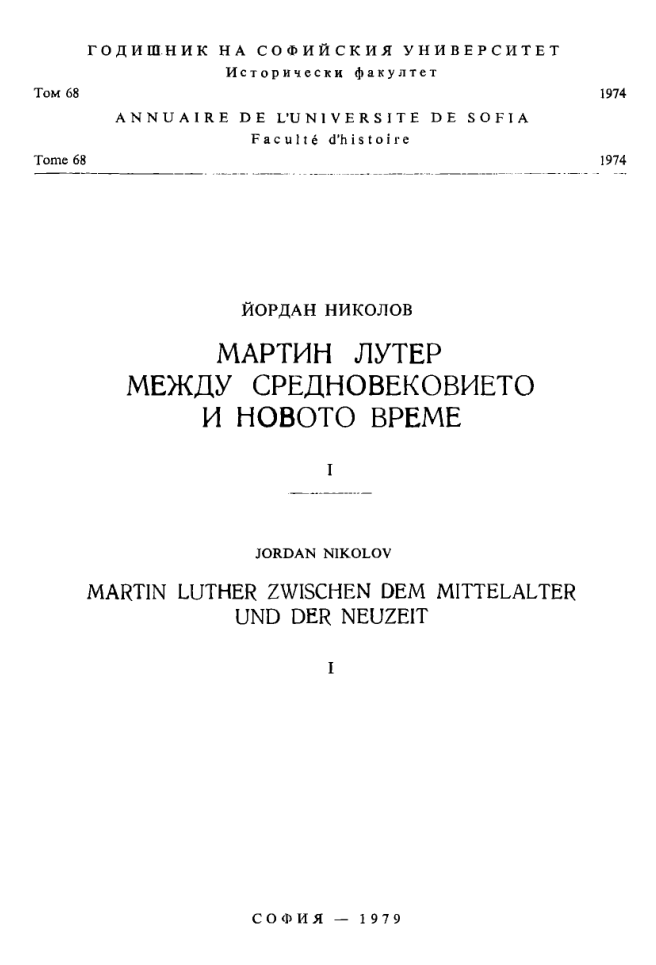Martin Luther between the Middle Ages and the Modern Times
DOI:
https://doi.org/10.60053/GSU.IF.1.68.99-167Keywords:
Martin Luther, Thomas MunzerAbstract
In the history of the early bourgeois German Revolution rise the colossal figures of Martin Luther (1483-1546) and Thomas Munzer (1490- 1525), the leaders of the two main trends in the profound social conflict that shook Europe - the moderate-bourgeois, and the revolutionary-peasant-tribal. Connected to one degree or another with the development of the mass anti-feudal movement in sixteenth-century Germany, the two Reform Tories shared a number of features characteristic of fighters against the dominant social order, as well as some unique peculiarities. If Luther with the act of 31. X. 1517 marked the beginning of the pan-Germanic reformation movement, Munzer is associated with the greatest sweep of the revolution, which found its climax in the Great Peasant War (1524-1525). This means that their activity, though different in its ideological charge, flowed into the general unified stream of the early bourgeois revolution, which began with the Reformation and ended with the epic of the peasant-tribal masses rising up to struggle for the destruction of the dominant feudal regime, for the construction of a new social order. The one took the lead of the movement, but when he saw its irrepressible revolutionary sweep, frightened by the unknowns of social upheaval, he went over to the side of the princes; the other continued the struggle to its heights, bravely led the detachments of the urban plebs and the rural poor, and finally gave his life for the sake of his utopian-communist ideas. The one denounces the revolution, the other becomes its tireless, ardent defender and ideologue. Unlike Munzer, who overcame the limits of his century and in his ideological conceptions anticipated and profiled the future communist days, Luther remained within the framework of the momentous transitional time in which he lived, unable to go beyond the limits of his epoch. Herein lies one of the reasons for his historical narrowness.
References
По този въпрос вж. М. Steinmetz Die fruhblirgerliche Revolutioп iп Deutschland (1476-1535). Thesen zur Vorbereituпg dеr vissenschaftlichen Konferenz in Wernigerode vоn 20. bis 24. Januar 1960. Zeitschrift fur Gecschichtswissenschaft, Н. 1; 1960, Die fruhbiirgerlichs. Revolution in Deutschland. Referat zum Thema Probleme dег fruhburgerlichen Revolution in Deutschland 1476-1535. Berlin, 1961; М. Stеinmеtz. Der fruhburgerlichen Revolution in Deutschland - Lehre - Forschung Praxis. Leipzig, 1963; М. Stеinmеtz. Reformation und Bauernkrieg als Revoltition. Evolution und Revolution in der Weltgeschiclite, ZPG, 1965, SH; D. Lоsсhе. Рrоblеmе der
Revolution in Deutschland. JBG, Bd. 2, 1967; G. Вrеndlе 1 Reformation und Revolution. GUS, 1968, Н. 3; G. Fоgl Marx, Engels
und die Konzeption einer Revolution in Deutscbland. Einer Diskussion. ZFG, 1969, Н. 6; G. Zsсuаbitz. Uber historischen Standort und Moglichkeiten de Revolituon in Deutschland Studie die Revolution. Вerlin, 1969; А. Lаubе, М. Stеin, G. Fоglеr. Illustrierte Geschichte dеr
deutschr Revolution. Berlin, 1974.
По-важните, заслужаващи внимание работи за Лутер, излезли в ГДР, са следните:
Е. А r n d t. Luthers deutsches Sprachscl1affen. Berlin, 1962; К. К I е i n s с h m i d t. Martin
Luther. Ein Beitrag zur Geschichte der deutsc1e11
Reforшatioп. Berlin, 1953; L. S t е r n.
Martin Luther und Philipp Melaпchthon -
ihre ideologische Herkuпft 11nd gesc11ichtliche Lei-
stung. Вerlin, 1953; О. Т h u I i 11. Martin Lt1tl1er. Sein Leben in Bildern LJnd Zeitdokuшenten.
Berlin, 1963; G. Z s с h ii Ь i t z. Martiп Lutl1cr. Grosse und Grenze, Bd. I, 1483 -
Ber-
lin, 1967; W. F I ii s с 11 е n d r ii g е r. Martin Lпther. Leipzig, 1967.
М. М. Сми р и н. Народная реформация Томаса Мюнцера и Великая крестьянская
война в Германии, 11 11зд. М., 1955; А. Ме t1 s с 1. Thomas Miintzer uпd seine Zeit. Ber1in,
; М. В е n s i n g. Thomas Miintzc1·. Leipzig, 1962; М. В е n s i n g. Thomas Miiпtzer uпd
der Thuri11ger Aufstand 1525. Berlin, 1966;
М. S t е i n ш е t z. Das Mii11tze1·blld vоп Martin
Luther Ьis Fгiedrich Engels. Berlin, 1971; Der deutsche Bauernkrieg und Thoшas Miintzer, Aus-
gewiihlte Beitrage der wissenschaftlicl1en Konfereпz „Der det1tscl1e Baueгпkrieg -
seine Stel-
lung in der deutsc11en tшd eнropaischeп Geschichte. ProЫeme-WirkL1nge11 -
Veгpflicl1tungeп,
Karl-Marx-Uпiveгsitiit Leipzig, 3. Ьis 7. Februar 1975, In Verblndпng шit Siegfried Ноуег,
Ernst Ullшaпn uпd Hans Wermes l1erat1sgegeЬen Мах Steinmetz, Karl-Marx-Universitiit Leip-
zig, 1976; вж. също така Й. Н и к о л о в. Томас Мюнцер като реформатор. -
Атеистична
трибуна. С., 1974, 5; същият. Томас Мюнцер -
велик европейски мислител и революционер.
-
Исторически преглед, 1975, 3; същият. Мирогледът на Томас Мюнцер. -
Философска
мисъл, 1975, 12.
• Върху Великата селс!(а война вж. Der deutsche Bauemkrieg. Berliп, 1972; W. Z i ш m е I-
m а n n. Der Grosse deнtsche Baнernk1·ieg. Berliп, 1975; G. F r а 11 z. Der deutscl1e Bauernk1·ieg.
Darmstadt, 1969; А. W а а s. Die Bauern im Kampf uш Gerichtigkeit 1309 Ьis 1525. Miinchen,
; Zur Geschic1te des Gгossen deutscheп Baвernkricg. Dokumente und Materialieп, zusaш
mengestellt und bearbeitet vоп W. Zollner. Bcrlin, 1961; М. В е n s i n g, S. Н о у е r. Dег deu-
tsche Bauerпkrieg 1524-:;-1526. Berlin, 1975; М. К о Ь u с h,
Е. М ii 11 е r. Der deнtscl1en
Bauernkrieg in
Dokшneпten. Weimar, 1975.
• А.Ме tl s е. Tlюmas Miiпtzer нпd seine Zeit. Berlin, 1952, S. 39-41; М. S t е i 11 m е I z.
Deutschland vоп 1476 Ьis 1648. Berlin, 1967, S. 162.
• Вж. по-подробно у М. М. Смири
н. Народная реформация Томаса Мюнцера и
Великая крестьянс!(ая nойна, с. 555 и сл.
М. S t е i 11 ш е t z. Deвtschland von 1476 Ьis 1618, S. 162.

Downloads
Published
How to Cite
Issue
Section
Categories
License
Copyright (c) 1979 Jordan Nikolov

This work is licensed under a Creative Commons Attribution 4.0 International License.
Annual of Sofia University "St. Kliment Ohridski" - Faculty of History (GSU-IF).







